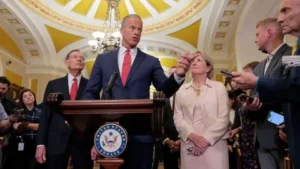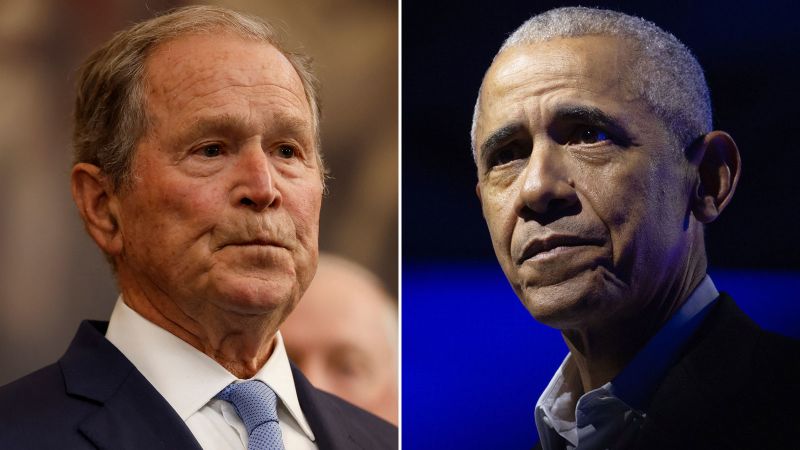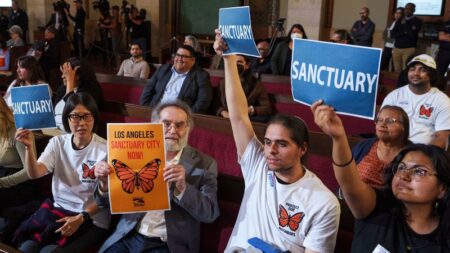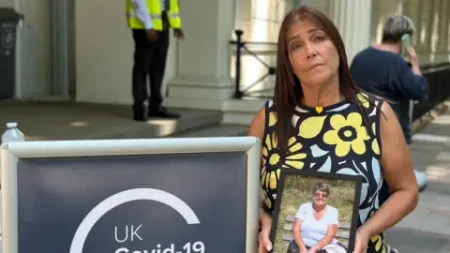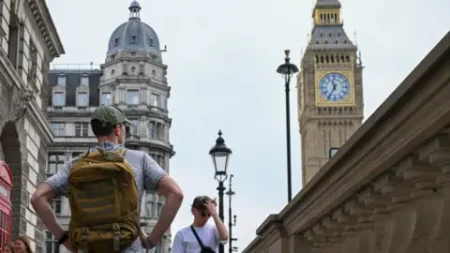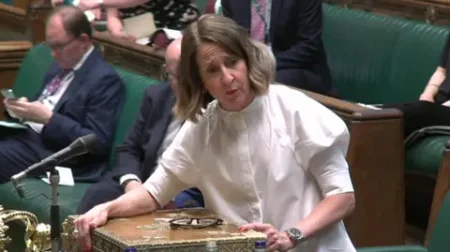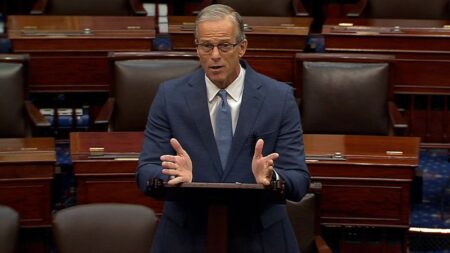On a poignant afternoon, former Presidents Barack Obama and George W. Bush, alongside humanitarian rock icon Bono, partook in an emotional farewell to the staff of the U.S. Agency for International Development (USAID). This event, marked by open criticisms of the Trump administration’s policies, particularly concerning the dismantling of USAID, was an extraordinary moment of bipartisan solidarity reflecting the importance of global humanitarian initiatives. Obama, in a charged address, labeled the Trump administration’s actions as “a colossal mistake,” highlighting the adverse implications of diminishing such a key agency that has been vital for American diplomacy and global development since its inception in 1961 under President John F. Kennedy.
Monday’s event was especially significant as it marked the last operational day for USAID as an independent agency, an organization that has served for six decades with the mission to influence U.S. national security positively through international goodwill and rural prosperity development. Following the directives from Secretary of State Marco Rubio, USAID was incorporated into the State Department on Tuesday, spurring fears about the future of U.S. international aid.
During a video conference aimed primarily at the USAID community, former Presidents Obama and Bush, along with Bono, addressed thousands of staffers, offering support and expressing solidarity with those who faced job loss due to the cuts. The closed-press format allowed for genuine dialogue about the dismay surrounding the staff cuts and the agency’s future. Observing systems being abruptly severed, and responses being delivered via mass emails, it became evident that USAID was amongst the first agencies to undergo significant downsizing under President Trump and his administration’s aggressive budget cuts.
The criticisms voiced were rooted in what many viewed as severe oversights by the Trump administration. Trump himself had derogatorily referred to USAID employees as being “radical left lunatics,” asserting claims of “tremendous fraud” within the agency, while Elon Musk labeled it “a criminal organization.” These harsh criticisms prompted a counter-response from Obama, who reassured the USAID staff that their work resonates through generations, underscoring that humanitarian aid matters deeply and will continue to shape the future positively.
In a rare moment of public engagement, Obama emphasized the critical role USAID plays in promoting global economic growth, thereby creating viable markets for American goods. “Gutting USAID is a travesty, and it’s a tragedy. Because it’s some of the most essential work happening anywhere in the world,” he earnestly stated while predicting that both Republican and Democratic leadership would eventually recognize the necessity and impactful presence of the agency.
Bush, not one to shy away from defending programs initiated during his presidency, specifically mentioned the profound effects of the President’s Emergency Plan for AIDS Relief (PEPFAR), which has been credited with saving approximately 25 million lives. While bipartisan efforts partly shielded PEPFAR from being adversely affected by budget cuts, substantial alterations have emerged that have limited access to life-saving care.
Messages of support also poured in from former global leaders, including Ellen Johnson-Sirleaf of Liberia and Juan Manuel Santos of Colombia, emphasizing the essential role that USAID and its staff played in promoting democracy and easing humanitarian crises worldwide. Meanwhile, humanitarian workers recounted personal stories that illustrated the profound impact USAID has made on global communities.
Bono’s presence was a highlight of the gathering. Known for his advocacy, he recited a heartfelt poem in remembrance of the agency’s significant contributions and lamented the dire consequences of impending cuts. He poignantly captured the emotion of the room, stating, “They called you crooks. When you were the best of us,” rendering a somber reflection on the stark challenges and criticisms that humanitarian workers face.
As the new era of the U.S. foreign assistance program transitions to what is dubbed the “America First” initiative, the State Department assured the American public that there would be a robust oversight mechanism to ensure that taxpayer dollars would serve national interests effectively. This transition, while presented as a move towards efficiency, has raised concern among humanitarian advocates who fear the loss of vital services previously provided by USAID.
The emotional closure to this chapter in U.S. foreign relations signaled deep-rooted discussions about the implications for humanitarian programs globally and urged leaders to reflect upon their moral obligations to aid those in dire need. The future could see both challenges and an urgent call for renewed commitment to international development under restructured governance.



